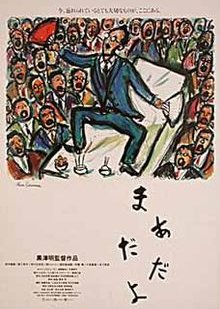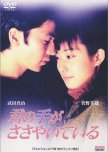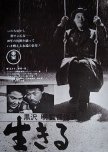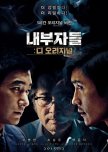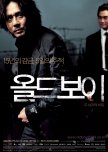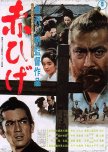
"Not yet!"
At 83, director Kurosawa Akira showed his creative drive was still going strong. However, he didn’t get his wish to die on set behind the camera on this his final film. What he did, was give us a film with a main lead who in many ways stood in for him and his desires and contemplative messages. The film might have been loosely based on Uchida Hyakken’s novel but it felt like watching Kurosawa take his final bow.In 1943 Professor Uchida greets his class and tells them that he is resigning in order to write full-time. His students are devoted to him and tell him they will continue to follow him. They help the professor when he and his wife move into a larger home which later ends up catching fire in an air raid. The couple is relegated to a small shack with a few meager possessions afterwards. The students begin work on a plan to have a better home built for the professor. To boost the professor’s morale when he regrets living the life of a beggar, they hold a birthday party for him called the Not Yet Feast on his 61st birthday. The play on words comes from the game hide and seek when children would yell, “are you ready?” and the response would often be “not yet!” or madadayo. Though provisions were few, the students and professor had a raucous time at the celebration. “Are you ready to die?” “Not yet!”
“Did that just go over their heads?”
Kurosawa’s work came across as uncharacteristically hopeful in this film. The professor was described as pure gold. Eccentric, imaginative, and a prankster, the students loved him. The students were unequivocally kind and devoted to him. Whereas most Kurosawa leads had to face grueling trials in order to have character development, the Professor came fully and nearly perfectly formed. The pessimistic and deeply flawed people were missing as well as the tumultuous inner struggles. Even the students whose names were barely mentioned were deeply kind and loyal. Unlike earlier films with biting social commentary, the historical events in Madadayo were a thin construct that had minimal impact on the characters. The hardships were briefly alluded to and overcome, unlike Kurosawa’s usual criticisms surrounding the war and post war struggles. It was if Kurosawa said, “I’ve already covered that.”
“Congratulations should be short. Eulogies should be long.”
In each of his dwellings, the Professor sat in his doorway and wrote. There were no battles or betrayals, the most tragic event in the film was when a cat went missing. This film focused on the Professor’s interior musings and the interiors of his homes and the banquet halls where the Not Yet Feasts were held. Despite his insistence on an almost hermit-like existence with signs that ranged from “The temple where guests are forbidden” to roughly translated, “Whaddya want?” the Professor was nearly always surrounded by adoring students. When the Professor needed a house, the students made it happen. When the Professor’s cat went missing, they beat the bushes to find the friendly feline. In most Kurosawa films, everyone needed to watch their backs. In Madadayo, it was the nice being nice to the nice, injected with gentle humor and wisdom.
“The flowing river never stops and the water is never the same as before. The bubbles that float in the pools, now vanishing, now forming are not of long duration.”
After I recovered from the shock of realizing that everyone in the film was affectionate and generous to each other, I settled in and enjoyed the story. Kurosawa’s film style veered closer to Ozu’s than his own. Few scenes had his three deep perspective with action going on in the foreground, middle, and background. People were often sitting in a circle on the floor talking. There was a beautifully shot seasonal montage with the small shack going through fall, winter, and spring. The characters could have used improvement. The students’ personalities were never developed and the background wife never received a name. The cat even had a name, but not the wife! No mention was made of what the German language professor wrote that was so popular.
“That will be your calling, the work you put your heart into.”
What Madadayo did give us was different generations respecting and caring for each other. Kurosawa and Uchida were both facing death unflinchingly. This was not the time for fighting, but a time of introspection and peace while also contemplating the legacy of their work. The Professor encouraged the grandchildren of his students to find their treasure and to work hard for it, much as Kurosawa had.
Despite the utter lack of conflict, I enjoyed Madadayo. Every once in a while, I need a film that envelopes me in warmth and laughter. Perhaps that’s what Kurosawa needed as well. I was pleased when I saw Kurosawa’s red glow in the last scene and beautiful, tranquil clouds appeared. Then my eyes welled with tears when I realized it would be the last time for those trademark elements. If someone had asked Kurosawa if he was ready to stop creating or studying film, I think his answer would have been, “Not yet!”
26 February 2024
Was this review helpful to you?

